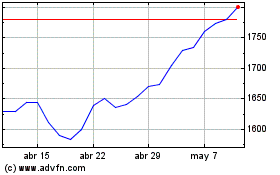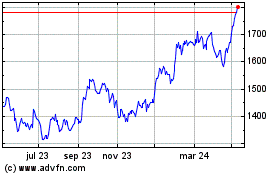TIDMGSK
RNS Number : 3466A
GSK PLC
22 September 2022
Issued: 22 September 2022, London UK
Oncologic Drugs Advisory Committee to review Zejula overall
survival data from the NOVA phase III trial in recurrent ovarian
cancer
GSK plc (LSE/NYSE: GSK) today announced that the US Food and
Drug Administration (FDA) will convene a meeting of the Oncologic
Drugs Advisory Committee (ODAC) to discuss overall survival (OS)
data from the ENGOT-OV16/NOVA phase III clinical trial . NOVA is a
randomised, double-blind, placebo-controlled phase III trial of
Zejula (niraparib), an oral, once-daily poly (ADP-ribose)
polymerase (PARP) inhibitor for the maintenance treatment of women
with platinum-sensitive recurrent ovarian cancer.
The phase III NOVA trial met the primary endpoint of
progression-free survival (PFS) in both the gBRCAm and non-gBRCAm
cohorts, demonstrating a statistically significant and clinically
meaningful treatment effect of Zejula in this patient population,
regardless of biomarker status. These PFS results served as the
primary basis for the US FDA approval for the maintenance treatment
of women with recurrent epithelial ovarian, fallopian tube, or
primary peritoneal cancer who are in complete or partial response
to platinum-based chemotherapy. Overall survival was a secondary
endpoint. Updated final overall survival data was recently shared
with the FDA.
Hesham Abdullah, SVP, Global Head of Oncology Development, GSK
said: "We believe PARP inhibitors, including Zejula, are important
options for the maintenance treatment of patients with recurrent
ovarian cancer, across all biomarker subgroups, who are in complete
or partial response to platinum-based chemotherapy. We look forward
to continuing our ongoing discussions with the FDA."
The ODAC meeting is scheduled for 22 November 2022. This is not
related to the niraparib indication in the maintenance treatment of
adult patients with advanced epithelial ovarian, fallopian tube, or
primary peritoneal cancer who are in a complete or partial response
to first-line platinum-based chemotherapy .
About ovarian cancer
Ovarian cancer is the eighth most common cancer in women
worldwide. [i] Despite high response rates to platinum-based
chemotherapy in the front-line setting, approximately 85% of
patients will experience disease recurrence. [ii] Once the disease
recurs, it is rarely curable, with decreasing time intervals to
each subsequent recurrence.
About Zejula (niraparib)
Zejula is an oral, once-daily PARP inhibitor currently being
evaluated in multiple pivotal trials. GSK is building a robust
clinical development programme by assessing activity across
multiple tumour types and evaluating several potential combinations
of Zejula with other therapeutics. The ongoing development
programme includes several combination studies.
ZEJULA is indicated:
-- for the maintenance treatment of adult patients with advanced
epithelial ovarian, fallopian tube, or primary peritoneal cancer
who are in a complete or partial response to first-line
platinum-based chemotherapy
-- for the maintenance treatment of adult patients with
recurrent epithelial ovarian, fallopian tube, or primary peritoneal
cancer who are in a complete or partial response to platinum-based
chemotherapy
Important Safety Information for ZEJULA
Myelodysplastic syndrome/acute myeloid leukemia (MDS/AML),
including some fatal cases, was reported in 15 patients (0.8%) out
of 1785 patients treated with ZEJULA monotherapy in clinical
trials. The duration of therapy in patients who developed secondary
MDS/cancer therapy-related AML varied from 0.5 months to 4.9 years.
These patients had received prior chemotherapy with platinum agents
and/or other DNA-damaging agents including radiotherapy.
Discontinue ZEJULA if MDS/AML is confirmed.
Hematologic adverse reactions (thrombocytopenia, anemia,
neutropenia, and/or pancytopenia) have been reported in patients
receiving ZEJULA. The overall incidence of Grade >=3
thrombocytopenia, anemia, and neutropenia were reported,
respectively, in 39%, 31%, and 21% of patients receiving ZEJULA in
PRIMA and 29%, 25%, and 20% of patients receiving ZEJULA in NOVA.
Discontinuation due to thrombocytopenia, anemia, and neutropenia
occurred, respectively, in 4%, 2%, and 2% of patients in PRIMA and
3%, 1%, and 2% of patients in NOVA. In patients who were
administered a starting dose of ZEJULA based on baseline weight or
platelet count in PRIMA, Grade >=3 thrombocytopenia, anemia, and
neutropenia were reported, respectively, in 22%, 23%, and 15% of
patients receiving ZEJULA. Discontinuation due to thrombocytopenia,
anemia, and neutropenia occurred, respectively, in 3%, 3%, and 2%
of patients. Do not start ZEJULA until patients have recovered from
hematological toxicity caused by prior chemotherapy (<=Grade 1).
Monitor complete blood counts weekly for the first month, monthly
for the next 11 months, and periodically thereafter. If
hematological toxicities do not resolve within 28 days following
interruption, discontinue ZEJULA, and refer the patient to a
hematologist for further investigations.
Hypertension and hypertensive crisis have been reported in
patients receiving ZEJULA. Grade 3-4 hypertension occurred in 6% of
patients receiving ZEJULA vs 1% of patients receiving placebo in
PRIMA, with no reported discontinuations. Grade 3-4 hypertension
occurred in 9% of patients receiving ZEJULA vs 2% of patients
receiving placebo in NOVA, with discontinuation occurring in <1%
of patients. Monitor blood pressure and heart rate at least weekly
for the first two months, then monthly for the first year, and
periodically thereafter during treatment with ZEJULA. Closely
monitor patients with cardiovascular disorders, especially coronary
insufficiency, cardiac arrhythmias, and hypertension. Manage
hypertension with antihypertensive medications and adjustment of
the ZEJULA dose if necessary.
Posterior reversible encephalopathy syndrome (PRES) occurred in
0.1% of 2,165 patients treated with ZEJULA in clinical trials and
has also been described in postmarketing reports. Monitor all
patients for signs and symptoms of PRES, which include seizure,
headache, altered mental status, visual disturbance, or cortical
blindness, with or without associated hypertension. Diagnosis
requires confirmation by brain imaging. If suspected, promptly
discontinue ZEJULA and administer appropriate treatment. The safety
of reinitiating ZEJULA is unknown.
Embryo-fetal toxicity and lactation : Based on its mechanism of
action, ZEJULA can cause fetal harm. Advise females of reproductive
potential of the potential risk to a fetus and to use effective
contraception during treatment and for 6 months after receiving
their final dose of ZEJULA. Because of the potential for serious
adverse reactions from ZEJULA in breastfed infants, advise
lactating women to not breastfeed during treatment with ZEJULA and
for 1 month after receiving the final dose.
Allergic reactions to FD&C Yellow No. 5 (tartrazine): ZEJULA
capsules contain FD&C Yellow No. 5 (tartrazine), which may
cause allergic-type reactions (including bronchial asthma) in
certain susceptible persons. Although the overall incidence in the
general population is low, it is frequently seen in patients who
also have aspirin hypersensitivity.
First-line Maintenance Advanced Ovarian Cancer
Most common adverse reactions (Grades 1-4) in >=10% of all
patients who received ZEJULA in PRIMA were thrombocytopenia (66%),
anemia (64%), nausea (57%), fatigue (51%), neutropenia (42%),
constipation (40%), musculoskeletal pain (39%), leukopenia (28%),
headache (26%), insomnia (25%), vomiting (22%), dyspnea (22%),
decreased appetite (19%), dizziness (19%), cough (18%),
hypertension (18%), AST/ALT elevation (14%), and acute kidney
injury (12%).
Common lab abnormalities (Grades 1-4) in >=25% of all
patients who received ZEJULA in PRIMA included: decreased
hemoglobin (87%), decreased platelets (74%), decreased leukocytes
(71%), increased glucose (66%), decreased neutrophils (66%),
decreased lymphocytes (51%), increased alkaline phosphatase (46%),
increased creatinine (40%), decreased magnesium (36%), increased
AST (35%) and increased ALT (29%).
Maintenance Recurrent Ovarian Cancer
Most common adverse reactions (Grades 1-4) in >=10% of
patients who received ZEJULA in NOVA were nausea (74%),
thrombocytopenia (61%), fatigue/asthenia (57%), anemia (50%),
constipation (40%), vomiting (34%), neutropenia (30%), insomnia
(27%), headache (26%), decreased appetite (25%), nasopharyngitis
(23%), rash (21%), hypertension (20%), dyspnea (20%),
mucositis/stomatitis (20%), dizziness (18%), back pain (18%),
dyspepsia (18%), leukopenia (17%), cough (16%), urinary tract
infection (13%), anxiety (11%), dry mouth (10%), AST/ALT elevation
(10%), dysgeusia (10%), palpitations (10%).
Common lab abnormalities (Grades 1-4) in >=25% of patients
who received ZEJULA in NOVA included: decrease in hemoglobin (85%),
decrease in platelet count (72%), decrease in white blood cell
count (66%), decrease in absolute neutrophil count (53%), increase
in AST (36%), and increase in ALT (28%).
Please see accompanying US Prescribing Information.
About GSK
GSK is a global biopharma company with a purpose to unite
science, technology, and talent to get ahead of disease together.
Find out more at gsk.com/company .
GSK enquiries
Media: Tim Foley +44 (0) 20 8047 (London)
5502
Dan Smith +44 (0) 20 8047 (London)
5502
Kathleen Quinn +1 202 603 5003 (Washington DC)
Lyndsay Meyer +1 202 302 4595 (Washington DC)
Investor Relations: Nick Stone +44 (0) 7717 618834 (London)
James Dodwell +44 (0) 20 8047 (London)
2406
Mick Readey +44 (0) 7990 339653 (London)
Josh Williams +44 (0) 7385 415719 (London)
Jeff McLaughlin +1 215 751 7002 (Philadelphia)
Cautionary statement regarding forward-looking statements
GSK cautions investors that any forward-looking statements or
projections made by GSK, including those made in this announcement,
are subject to risks and uncertainties that may cause actual
results to differ materially from those projected. Such factors
include, but are not limited to, those described in the Company's
Annual Report on Form 20-F for 2021, GSK's Q2 Results for 2022 and
any impacts of the COVID-19 pandemic.
Registered in England & Wales:
No. 3888792
Registered Office:
980 Great West Road
Brentford, Middlesex
TW8 9GS
[i] Worldwide Cancer Data. World Cancer Research Fund.
https://www.wcrf.org/dietandcancer/cancer-trends/worldwide-cancer-data.
Updated January 10, 2022. Accessed July 2022.
[ii] Lorusso D, Mancini M, Di Rocco R, Fontanelli R, Raspagliesi
F. The role of secondary surgery in recurrent ovarian cancer
[published online August 5, 2012]. Int J Surg Oncol. 2012.
doi:10.1155/2012/613980. Accessed September 2022.
This information is provided by RNS, the news service of the
London Stock Exchange. RNS is approved by the Financial Conduct
Authority to act as a Primary Information Provider in the United
Kingdom. Terms and conditions relating to the use and distribution
of this information may apply. For further information, please
contact rns@lseg.com or visit www.rns.com.
RNS may use your IP address to confirm compliance with the terms
and conditions, to analyse how you engage with the information
contained in this communication, and to share such analysis on an
anonymised basis with others as part of our commercial services.
For further information about how RNS and the London Stock Exchange
use the personal data you provide us, please see our Privacy
Policy.
END
MSCBDGDCRSDDGDD
(END) Dow Jones Newswires
September 22, 2022 09:00 ET (13:00 GMT)
Gsk (LSE:GSK)
Gráfica de Acción Histórica
De Mar 2024 a Abr 2024

Gsk (LSE:GSK)
Gráfica de Acción Histórica
De Abr 2023 a Abr 2024
